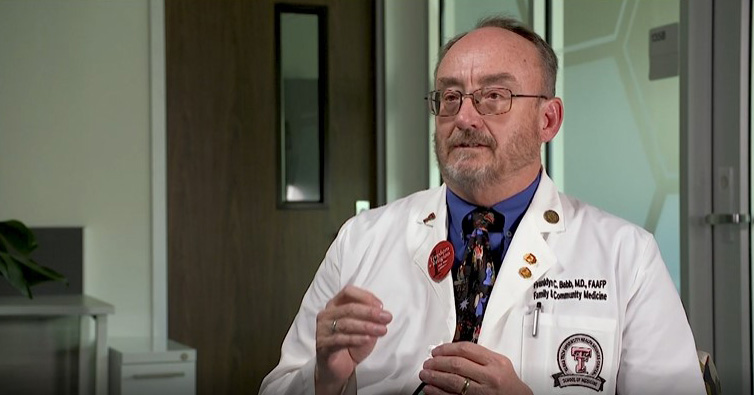Improving One’s Health in the New Year
Physician Recommends Starting with a Wellness Exam

Getting healthy is one of the most common resolutions people make as another new year begins, but there is more to improving one’s health than skipping that extra donut or taking the stairs a few times a week. Many people believe joining a gym or taking up the latest diet plan are the keys to improving their health, but before doing so, Frank Babb, M.D., recommends people schedule a wellness exam with their family doctor.
Babb, a family physician for Texas Tech Physicians and a professor of family medicine at Texas Tech University Health Sciences Center (TTUHSC), said wellness exams typically focus on preventative care to identify any potential health issues before they become a problem and to ensure the patient is in good health. Depending on the age of the patient, wellness exams — sometimes referred to as an annual physical — may not be necessary every year.
“The time that we actually are requiring an annual visit is age 65 and over,” Babb said. “Our younger adult patients in the age range of 30 and above should be evaluated every one to three years for a physical exam, or a wellness exam. For younger adults who are basically healthy and don't have any other medical concerns — basically ages 19 to 29 — we're looking at anywhere from two years up to five years possibly. So the term annual physical exam is a bit of a misnomer for some patients.”
During a wellness exam, the patient will be asked about their diet, exercise and how they feel about their overall health. The physician also will look for specific markers that indicate a patient may be at risk for certain disease processes. For instance, patients at Texas Tech Physicians should expect to have their blood pressure checked at every visit. Though current recommendations say taking a patient’s blood pressure every two years is sufficient, Babb said they check it each visit to make sure the patient isn’t developing hypertension. Monitoring blood pressure each visit also allows treatment to begin sooner rather than later for patients at risk.

The physician also will make sure the patient’s immunizations such as Tdap (tetanus, diphtheria and pertussis) are up to date. They also will begin screening patients for colorectal cancer at age 50, though screening could be recommended for patients at age 45, depending on factors such as family history, diet, weight and others. For patients who prefer an alternative to a colonoscopy, Babb said they could undergo a stool study that can be performed at home every three years.
“We send you a box, as people see in the commercials, and you collect a stool sample,
put it in the container provided and send it back,” Babb explained. “This test is
a DNA probe, and it looks for signs that there's cancer. If it's positive, then you're
going need the colonoscopy anyway, but for people that just don't want to go through
the bother of preparing for a colonoscopy, this a way to [potentially] avoid that.”
Female patients also are screened for cervical cancer beginning at age 21, and then
again every three years until they reach age 30. Once a woman reaches age 30, Babb
said the screenings are typically conducted every three to five years as long as the
patient has undergone human papilloma virus code testing.
Babb said the remainder of the wellness exam typically includes:
- Listening for abnormal sounds in the patient’s heart and lungs. This entails listening for the heart’s rhythm and for heart murmurs, which are extra sounds in the heart that may indicate further testing is needed, and for lung sounds that indicate whether or not the patient is getting sufficient air throughout all of their lung fields.
- Examining the stomach and abdomen area to make sure there is no issue with tenderness
- A complete blood count, or CBC to check for anemia.
- A comprehensive metabolic panel to determine how well the kidneys and liver function.
- A thyroid study if the patient indicates that there may be some issues with their thyroid.
- A cholesterol panel approximately every five years for patients 40 years and older. If a patient has an atypical family history for heart disease, a lipid panel may be conducted to check for familial hyperlipidemia, an inherited condition that leads to an elevated LDL (bad cholesterol) level that means the patient should be monitored and treated at a younger age.
- A discussion of the patient’s therapeutic lifestyle changes, which includes talking about avoiding processed foods and how to make sure one is getting a minimum of 150 minutes of good physical activity each week.

Despite all of the questions, tests and evaluations, Babb said there is one group of patients whose overall health is difficult to improve: those who smoke cigarettes.
“One of the things I tell my patients is that if they're a smoker, there's absolutely nothing I can do for their health that would be better for them than for them to stop smoking,” Babb said. “It’s very dangerous to everybody's health; there's no such thing as a safe cigarette. So we encourage our patients, if they are smokers, to stop smoking.”
Babb said there are medications that can be prescribed to help our patients kick the cigarette habit.
“We also have support mechanisms that we can enroll our patients in so that they can actually get the kind of support — emotional and even physical support — to stop smoking cigarettes,” he added.
When patients are scheduled for a wellness exam, Babb said there are certain things they can do to help the physician such as bringing in all of their medications, knowing their family medical history and providing their own history of surgeries and diseases.
“If you've had some of the tests done, and you have those records, bring them with you,” Babb emphasized. “If you've had a colonoscopy, and you have the results, please bring that; and if you have your immunization record, please bring that also because it will help us.”
Babb suggested patients also be prepared to ask questions about their health, how it can be improved and how often they should undergo a wellness exam.
“If the patient has some concerns, we'd like to hear those aired; we'd like them to talk about that,” Babb said. “But if they really don't have any concerns, and we haven't [talked about] some of those things, then the patient needs to ask us, “What can I do to improve my health?” That will help trigger the conversation.”
Related Stories
The John Wayne Cancer Foundation Surgical Oncology Fellowship Program at Texas Tech University Health Sciences Center Announced
TTUHSC is collaborating with the John Wayne Cancer Foundation and has established the Big Cure Endowment, which supports the university’s efforts to reduce cancer incidence and increase survivability of people in rural and underserved areas.
Making Mental Health a Priority in the New Year
Sarah Mallard Wakefield, M.D., a psychiatrist with Texas Tech Physicians, talks about strategies to combat widespread and growing anxiety.
TTUHSC Dean to be Inducted into the National Academies of Practice as Distinguished Fellow
Gerard E. Carrino, Ph.D., MPH, dean of the TTUHSC Julia Jones Matthews School of Population and Public Health, will be inducted into the National Academies of Practice (NAP) as a Distinguished Fellow of the Public Health Academy.
Recent Stories
The John Wayne Cancer Foundation Surgical Oncology Fellowship Program at Texas Tech University Health Sciences Center Announced
TTUHSC is collaborating with the John Wayne Cancer Foundation and has established the Big Cure Endowment, which supports the university’s efforts to reduce cancer incidence and increase survivability of people in rural and underserved areas.
TTUHSC Receives $1 Million Gift from Amarillo National Bank to Expand and Enhance Pediatric Care in the Panhandle
TTUHSC School of Medicine leaders accepted a $1 million philanthropic gift from Amarillo National Bank on Tuesday (Feb. 10), marking a transformational investment in pediatric care for the Texas Panhandle.
Texas Tech University Health Sciences Center Permian Basin Announces Pediatric Residency Program Gift
TTUHSC Permian Basin, along with the Permian Strategic Partnership and the Scharbauer Foundation, Feb. 5 announced a gift that will fund a new pediatric residency.
